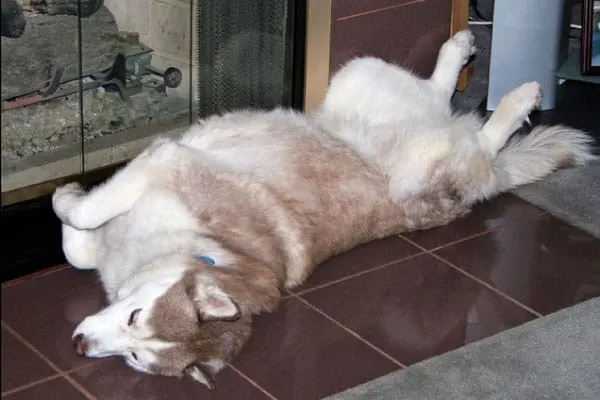Is your husky sleeping more than normal? Knowing how much sleep is normal for your husky will explain a lot.
This article covers everything you need to know about huskies and their sleeping habits.
- If your husky is sleeping a lot, it’s likely due to either their age, activity level, size, health & diet, or medication they may be taking.
- The average amount of sleep a husky should have is 14 to 16 hours per day. Your husky may need more or less depending on her activity level, age, size, and general health.
Table of Contents
How much sleep should a husky have?
14 hours seems like a lot of sleep but for your husky, this will be very normal. Sometimes it will be a little under 14 hours, and sometimes over.
Huskies are a very energetic breed and love intense physical exercise. Hopefully, you’re already giving your husky at least 2 hours of running, chasing, hiking and if you can, sled pulling every day! If you are, that’s great… and will be a big reason why your husky will need 12-16 hours.
While your husky is awake and active, he’ll be using a lot of his energy, sniffing around, playing, and not to mention trying to escape! sorry… husky joke! After all of this playtime, he will need large chunks of rest to regain his energy.
Most husky owners and dog owners, in general, will find that their dog takes naps throughout the day, for around a couple of hours at a time with a big sleep throughout the night.
It’s also possible for your husky to sleep when he’s bored or hasn’t got anything else to do. This isn’t just limited to huskies either, in fact, all dogs enjoy a nice nap if they’re particularly bored.
5 Factors affecting your husky’s sleep requirements
There are various things that will change the amount of sleep your husky will need. By knowing this you’ll better understand why your husky may sleep more or less than normal on any given day.
Things that can change the amount of sleep your husky may need are:
1. Activity level
2. Age
3. Size
4. Health
5. Medication
Let’s take a look at each of these in more detail.
1. Activity Level
This one is fairly straightforward. If you’ve had a long day out hiking or running with your husky, then it’s likely your fluffy friend will sprawl out on the floor as soon as you get home! Even giving your husky a new toy that he chews and tosses around for hours will lead to him snoozing.
Something common heard from many owners is about their husky being “lazy” You may not realize but the bursts of energy your husky spurts out will always result in rest.
As long as your husky doesn’t have a medical issue, there’s no real reason to be worried about him being “lazy”. Perhaps he’s bored or you’ve been out of the house for many hours. This will also result in a sleepy husky.
2. Age
Age will definitely change the amount of sleep your husky will need.
Husky puppies are growing at a really fast rate and this consumes a lot of their energy. It’s not uncommon for husky puppies to sleep up to 20 hours per day.
Adult huskies will generally follow the usual 12-16 hours per day range and will usually need less sleep than a puppy.
You know what they say, when we get older, we become more alike to babies again! An old husky will sleep more than a healthy middle-aged husky. When a dog gets older they will naturally wear out quicker and need to rest.
3. Size
The size of your husky will also change his sleep requirements. Most huskies will actually be similar in size but If you have a particularly large husky, he will usually tire more quickly than a smaller husky.
4. Health
If your husky has any health issues, this will certainly change his sleep. Depending on the particular health issue, this will cause different changes.
In general, any illness or cancer will sap the energy from your fluffy friend and will usually lead him to sleep what seems like all day. Other things like hormonal imbalances can also make him more sleepy than normal. Source
If you notice that your husky is sleeping a lot more than the average amount, upwards of 18 hours per day, then you should take him to a professional vet for a check-up.
In some cases the opposite will happen, some health conditions will actually keep your husky awake. Some injuries and diseases can cause enough pain and discomfort to keep your husky from resting the amount he needs to.
5. Medication
If your husky has health issues and is on medication, this can also be a reason why he’s sleeping more than usual.
A lot of common medication can make him very drowsy and lethargic. Anxiety medication for dogs, in particular, has a big impact on the brain and makes them very sleepy.
If you’ve recently given your dog a new medication it’s important to monitor his reaction carefully. Contact your local veterinarian if your dog’s behavior and sleep are excessively different.

Should you be concerned?
Should you be concerned about how much your husky is sleeping? If he’s displaying any of these symptoms below, then a trip to the vet is recommended.
1. If your dog’s sleeping pattern has drastically changed and increased by many hours.
2. Your dog is very lethargic and tired even after sleeping for a long time.
3. He can’t seem to get good sleep, continuously shuffling, changing positions, whining and displaying discomfort.
4. He is very slow to move and is not alert after waking up.
Always remember there are many different reasons why your husky may sleep for longer or shorter than usual.
Be aware of recent changes to your situation and environment and you’ll be better prepared to spot anything unusual.
What you can learn from husky sleeping positions

Huskies are known for their crazy sleeping positions. We may be very amused with their remarkable body positions while asleep, but it can usually tell us something interesting.
1. Back down, paws up
Probably one of your husky’s most preferred positions. This position signifies that he feels very comfortable and safe. This position naturally leaves him exposed and vulnerable, so he wouldn’t rest like this unless he felt absolutely secure.
2. Side stretch
This is the most common sleeping position for all dogs. Again, like sleeping on the back this requires him to feel safe and comfortable.
This position leaves his legs very free and relaxed, so it’s very normal to see a lot of dreaming and twitching while sleeping in this position.
3. Curled up
This position doesn’t necessarily signify that he doesn’t feel safe. But it is a position seen often from dogs living the wild or living in kennels. This position covers up his vital organs and its goal is to make him appear as small as possible.
This position is also another good temperature regulator. If it’s a little colder than usual, you’ll find your husky curled up more often.
4. The superman
This position is usually for two reasons, the first one being for regulating temperature, spreading out with his belly on the floor will help him expel heat if he’s too hot.
Surprisingly, It allows him to jump up to his feet quickly and be ready for action. This is a common position for puppies who don’t want to miss out on valuable playtime

Do dogs sleep like humans?
There are similarities in the way dogs sleep to how we sleep. For example, dogs and humans both go through different stages of sleep known as “short wave sleep” and deep sleep is known as REM sleep (Rapid Eye Movement) Source: Sleep Help Org
Although these various sleep stages are the same, dogs will enter into a deep sleep much quicker than humans usually do. This means that they come out of deep sleep quicker as well.
Due to dogs getting into the REM sleep quicker, it means they are able to have many short naps throughout the day whenever they need to get more energy. In just a couple of hours, they’ll have enough energy for more playtime. We need much longer periods of uninterrupted sleep, to feel re-energized.

Can your husky sleep in bed with you?
A very common question is should your dog sleep in bed with you?
Well, this one is hard to answer and it comes down to personal preference more than anything. A lot of owners say “It’s unhygienic, unsanitary, and unhealthy” while other owners say “It’s perfect for me and my dog, our sleep is great”
A recent study from the American Pet Products Association found that almost 50% of dogs sleep in their owner’s beds. The survey that they conducted discovered that it’s different depending on the size of the dog.
62% of small dogs slept with owners
41% of medium-sized dogs slept with owners
32% of large dogs slept with owners
The best way to answer this is to do what you think is best for you and for your husky, Although, an interview that Web MD held with Dr. Derek Damin of Kentuckiana Allergy, Asthma & Immunology from Louisville said that people that suffer from allergies, should refrain from doing this.
Thank you for reading and please comment below if you have some tips and advice for other husky owners out there. We can learn from each other!
Most Recommended For Huskies 🐶
Best Brushes For Husky Shedding ⭐
My two favorite brushes for a beautiful coat are a simple Undercoat Rake and a Slicker Brush. These brushes when used together will de-shed and maintain your husky’s coat better than anything else.
Best Online Training Program For Huskies⭐
Brain Training For Dogs has become very popular with Siberian Huskies in the last few years. Owners that have tried it say amazing things about the incredible results and how easily implemented the training is.
Best Husky Puppy Book ⭐
If you would like to support My Happy Husky directly and have an easy to read and entertaining guide for training your husky puppy, check out my book The Husky Puppy Handbook on Amazon. All purchases are greatly appreciated.

Disclaimer
The advice given in this article is for educational purposes only and does not constitute professional advice in any context. Before making any decisions that may affect the health and/or safety of your dog, you should always consult a trained veterinarian in your local area. For the FULL disclaimer Visit HereCopyright Notice: The content produced and published on My Happy Husky is unique and original. My Happy Husky makes an active effort to search for plagiarized content using plagiarism detection software. If plagiarized content is found, action will be taken.
